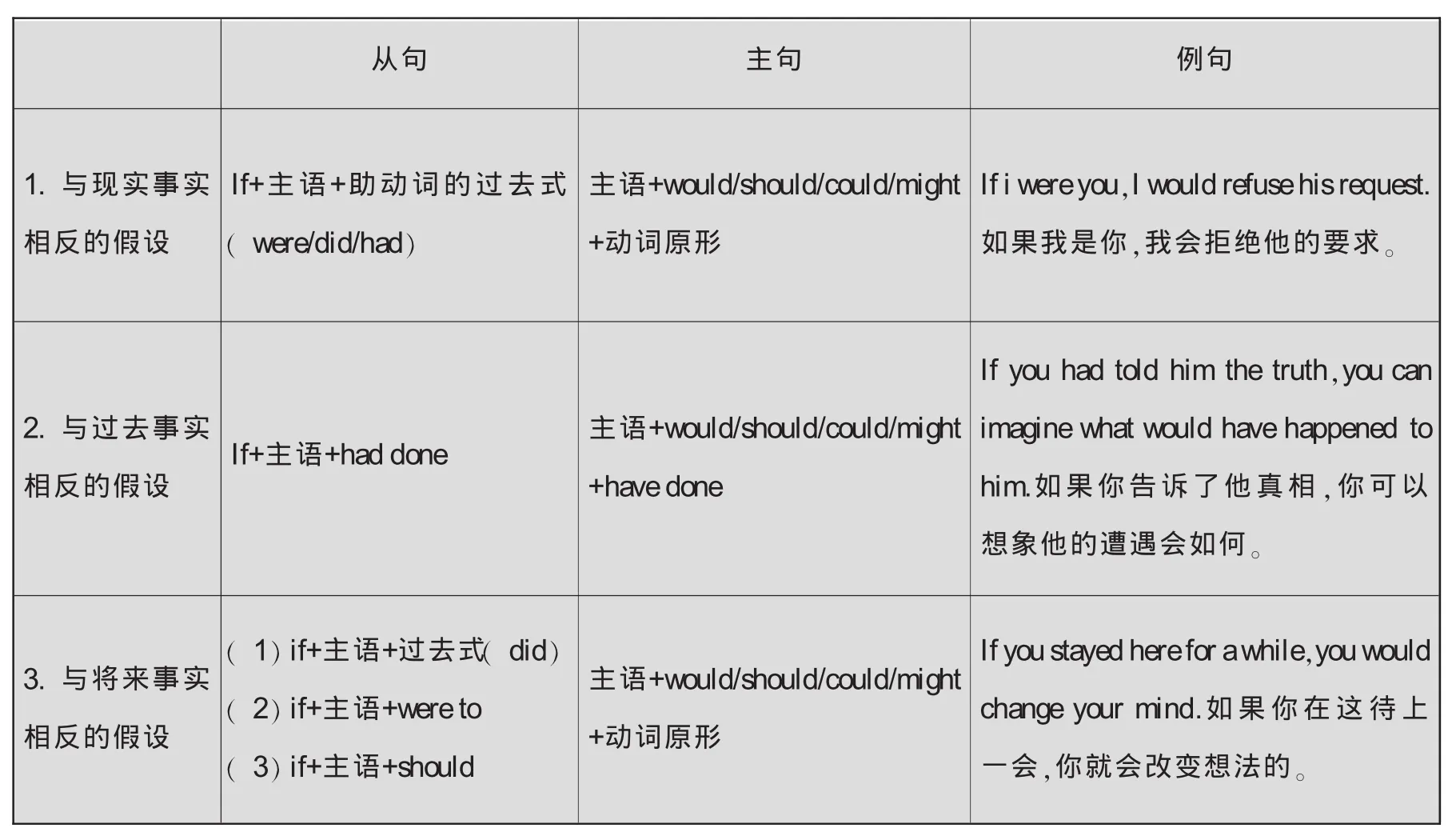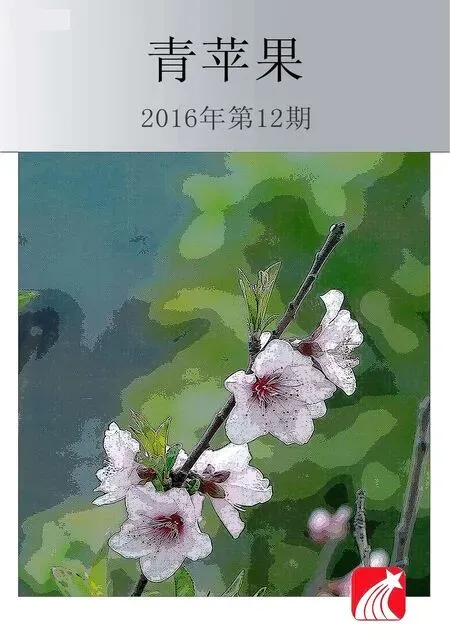高中英语的虚拟语气要点点拨
安徽省安庆十一中 罗燕
高中英语的虚拟语气要点点拨
安徽省安庆十一中 罗燕

英语中有三种语气:陈述语气、祈使语气和虚拟语气。对比前两种语气,虚拟语气表示说话人所说的不是事实,而是一种主观的假设、愿望、怀疑和推测。主要是通过谓语动词的不同形式来表现。
一、if引导的非真实条件句
一般来说,if引导的非真实条件句有三种形式:

典型例题
If I it with my own eyes,I wouldn't have believedit.
A.didn't see B.weren't seeing C.wouldn't see D.hadn't seen
【答案】D句意:如果不是我亲眼看到,我不会相信。主句中有wouldn't have believed,可以判断是与过去事实相反的虚拟语气,所以从句是if+主语+haddone的形式。故选D。
二、错综条件句
错综条件句,即条件从句与主句所表示的时间不一致。遇到这种情况,虚拟语气的形式应做相应的调整。
例:If you had followed my advice just now,you would not beworried about it now.
如果你刚才听了我的建议,现在就不用这么担心了。
注意
如果条件从句用if I were……,那么主句可表示任何时间的虚拟。同学们做题时要从句意进行分析。
例:If I were not busy,I would have come to see you.如果我不忙,我就去看你了。(从句表过去)
If I were you,I would be hurry.如果我是你,我就快点。(从句表现在)
典型例题
If he had spent more time practicing speaking English before,heable to speak it much better now.
A.will be B.would be C.has been D.would have been
【答案】B句意:如果他以前多花时间练习英语的话,他现在能说得好得多。从句中有时间词before,可以判断是与过去事实相反的虚拟语气;但是主句中的now提示了本题是错综条件句,主句应按照与现在事实相反的结构来做题,也就是would+动词原形。故选B。
三、条件句中if的省略情况
很多条件句中的if是省略的,这时候同学们就需要将句中的were,had或者would等移到句首,形成倒装。
例:Were you in my position,you would do the same.假如你在我的位置,你也会这么做的。
Had he followed my advice,he would have solved the problem.如果他听从了我的建议,他已经解决问题了。
Should it be necessary,I would at tend the meeting.如果有必要,我会参会的。
典型例题
It might have saved me some trouble the schedule.
A.did I know B.have I known C.do I know D.had I known
【答案】D句意:如果我早知道日程安排,可能会省去我一些麻烦。根据题干中might have saved可知主句是对过去的虚拟,从句应用if I had known。当if省去时,需要将had提前。故选D项。
四、含蓄条件句
有时在虚拟语气中并不出现if引导的条件句,而是暗含在短语或上下文中。比如用介词代替条件状语从句,这类介词有with,without,but for;文中如有otherwise,or等,同学们也可以通过意思来判断其是虚拟语气。
例:Without your help,we couldn't have finished the experiment.没有你的帮助,我们不可能完成实验。
He must have passed the test,or he never could have played like this.他一定是通过了考试,否则,他绝不会像这样玩的。
典型例题
Without his wartime experiences,Hemingway____his famous novel A Farewell to Arms.
A.didn't write B.hadn't written
C.wouldn't write D.wouldn't have written
【答案】D句意:没有他战时的经验,海明威就不可能写出著名的小说《永别了,武器》。根据without his wartime experience没有战时的经历,可知表示对过去的否定猜测,故主句用would have done,选D项。
五、情态动词用于虚拟语气
除了在if引导的非真实条件句中有不少情态动词的出现,情态动词还可表示推测等。
1.情态动词+动词原形(do),表示对现在或将来情况的推测。
例:I don't know what happened to her,she may beat home with her mum.我不知道她怎么了,她可能和她妈妈在家呢。
2.情态动词+动词现在进行时(be doing),表示对现在或将来正在进行的情况进行推测。
例:He must be doing his homework at the moment.他此刻想必正在做作业吧。
3.情态动词+动词完成时,表示对过去情况的推测。
例:She could' t have been in school,for she went abroad last month.她不可能出现在学校里,因为她上个月就出国了。
注意
(1)must have+donesth.表示对可能发生的事情的肯定推测,语气较强,有“肯定”、“想必”的意思。
例:The road is wet.It must have rained last night.路是湿的,昨晚一定下过雨。
(2)should/would/could/might/ought to/need have done含有“本来应该(要/能、可能/需要)做某事”的意思,表示与事实相反。
例:Mike should have told you what he saw.麦克本该告诉你他看见了什么。(实际上没有告诉)
He needn't have bought such an expensive necklace.他本不需要买这么昂贵的项链。(实际上买了)
典型例题
You____be Carol.You haven' t changed a bit after all these years.
A.must B.can C.will D.shall
【答案】A句意:你肯定是卡罗,这些年你一点也没有变化。must表示对现在的肯定推测。故选A。
I____have worried before I came to the new school,for my cl assmates here are very friendly tome.
A.mightn't B.mustn' t C.needn' t D.couldn't
【答案】C句意:我来新学校之前本没有必要担心,因为我的同学对我非常友好。needn't have done本没有必要做某事,表示实际上已经做了某事。故选C。
六、从句中的虚拟语气(wish)
1.由wish引导的宾语从句中,从句中的谓语动词常用过去式、过去完成式或情态动词加动词原形。
例:I wish I could fly.我希望我能飞。(与现在事实相反,用一般过去式)
I wish I had beent here.我真希望我当时在那里。(与过去事实相反,用过去完成式)
I wish he could at tend the conference tomorrow.我希望他能参加明天的会议。(对将来事实的虚拟,用情态动词+动词原形)
典型例题
I wish I____at my sister's wedding last Tuesday,but I was on a business trip in New York then.
A.will be B.would be C.have been D.had been
【答案】D句意:上个周二我本希望参加我姐姐的婚礼,但那时我在纽约出差。本题考查wish引导的宾语从句,表示与过去事实相反的愿望,从句用had done。故选D。
Ellen is a fantastic dancer.I wish I ____as well as her.
A.dance B.will dance C.had danced D.danced
【答案】D句意:艾伦是一个很棒的舞蹈演员。但愿我能和她跳得一样好。从句表示的是与现在事实相反的愿望,故用一般过去时,选D。
2.在It is/was important(necessary,desirable,essential,natural,strange等形容词)+that的主语从句中,谓语动词用should+动词原形。
例:It's important that we should be polite to every guest.对每个客人都有礼貌是很重要的。
3.含有suggest,demand,require,request,insist,order,command,propose等表示建议、请求、命令的词引导的名词性从句,从句的谓语动词为should+动词原形,其中should可以省去。
例:The police demanded that the party should be over before 11o'clock.警察要求派对要在11点前结束。
My suggestion is that you should apologize for what you did yesterday.我的建议是你应该为昨天的行为道歉。
4.在It's(high)time(that)引导的定语从句中,谓语动词用一般过去式。
例:It's time that we said good bey to each other.到了彼此说再见的时候了。
七、其他句型中的虚拟语气
1.在as if/as though引导的从句中,表示与现在事实相反或对现在情况有所怀疑,谓语用过去时;表示与过去事实相反,谓语用过去完成时。
例:He kept telling us what had happened as if he had been there himself.他不停地和我们讲发生的事情,好像他当时在场一样。
2.在would rather句型中,表示“宁愿自己做某事/做过某事”,谓语动词根据所虚拟的事实发生的时间用一般过去式或过去完成时。
例:I'd rather stay at home to watch TV.我宁可在家看电视。(与现在事实相反)
I would rather you had not left the book in classroom yesterday.我真希望你昨天没把这本书落在教室。(与过去事实相反)
3.用在某些独立句结构中表示愿望、希望。
例:God bless you!上帝保佑你!

